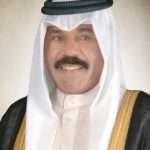Politics
Kuwait Politics
This page explores Kuwait’s political structure incorporating real-time RSS feed news and videos. By harnessing the power of RSS feeds, visitors can stay informed about the latest developments in Kuwait’s politics as they happen. The dynamic nature of these feeds ensures that users receive up-to-the-minute updates on political events, policy changes, and significant milestones, enabling them to stay abreast of the ever-evolving political scene.

Emir of Kuwait
Reign 30 September 2020 – present
Image credit
Kuwait, officially known as the State of Kuwait, is a small country located in the northeastern part of the Arabian Peninsula in Western Asia. With a rich history and vibrant culture, Kuwait has a unique political structure that sets it apart from many other nations in the region. Kuwait is a constitutional monarchy with a parliamentary system of government. The ruling Al Sabah family has held power since the 18th century, and the Emir serves as the head of state. The Emir plays a significant role in the political decision-making process and holds considerable executive powers, including the appointment of the Prime Minister and members of the government.
The political structure of Kuwait is based on a unicameral parliamentary system. The National Assembly, known as the Majlis al-Umma, is the legislative body of the country. It consists of 50 elected members representing different electoral districts. Kuwait has a long-standing tradition of political participation, and the National Assembly serves as a platform for public debate and the formulation of laws. The parliamentary elections in Kuwait are held every four years, and political parties are not officially recognized. Instead, candidates run as individuals or as part of loosely formed political groups known as “political blocs.” These blocs often consist of like-minded individuals who share common interests and ideologies.
The political landscape in Kuwait is dynamic and characterized by a lively political discourse. The National Assembly holds sessions where members debate and vote on proposed legislation. While the Emir and the government hold significant powers, the National Assembly has the authority to question ministers, propose legislation, and hold votes of confidence.
Despite occasional tensions between the government and the National Assembly, Kuwait’s political structure fosters a system of checks and balances and encourages political participation. The country has made strides in promoting democratic practices and ensuring a degree of political representation for its citizens. Kuwait’s political structure reflects its commitment to balancing the traditional values of the monarchy with the aspirations of a modern and progressive society.
Unless other sources are listed, original content is provided by ChatGPT. ChatGPT may produce inaccurate information about people, places, or facts. #Kuwait #KuwaitPolitics #KuwaitNews #KuwaitNewsToday #KuwaitRSSFeed #BlahFace



